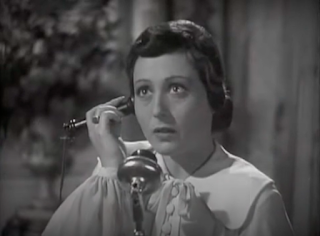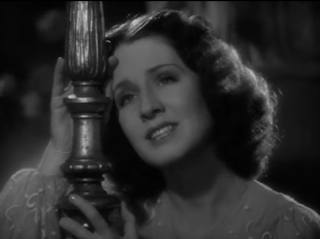Used to be, the Academy Awards were a celebratory evening of dinner and dancing. The winners were announced to the press in advance and the awards were distributed close to the end of the evening. The 9th ceremony was held at the Biltmore Hotel in downtown Los Angeles, and it is this ceremony that gets the showcase treatment when you visit the hotel's historic corridor:
My sister took that photo during her visit last weekend. You can see Cecil B. DeMille, Henry Fonda, Walt Disney. And on the lefthand side, the table on the dance floor draped in white, the figure wearing white - is that year's Best Actress Oscar winner, Luise Rainer. She almost didn't make it, preferring to spend the evening at home with her husband, playwright Clifford Odets. Indeed, all her rivals were at the ceremony already when news of her win trickled up from the press room. Inside Oscar reports that Gladys George, silent film star nominated for her big comeback turn in Valiant is the Word for Carrie, was inconsolable. It also reports that studio brass got on the horn and demanded Rainer get her ass down there so she could accept the Oscar in front of the cameras. And so:
Rainer's is a long and interesting life. German by birth, she became a stage star under the tutelage of Max Reinhardt (he who gave us 1935's A Midsummer Night's Dream). Emigrating to the United States as Hitler rose to power, she took the leading lady part in Escapade, starring...William Powell! Indeed, she was cast as a replacement for his frequent co-star Myrna Loy. She credited Powell with championing her in early Hollywood, teaching her how to adjust her talents for the camera. That partnership led directly to their reteaming in The Great Ziegfeld, with Myrna Loy appearing as the woman who replaces Rainer in Ziegfeld's life. Following a second consecutive win for The Good Earth, Rainer soon became disillusioned with Hollywood and MGM, feeling Louis B. Mayer did not have the same taste as recently-deceased Irving Thalberg. Her film credits end at 1941, and she appeared sporadically in television for the next sixty years. For a while, she was the oldest living Oscar winner, passing away in 2014 at the age of 104! And she was still giving interviews!
Does her performance hold up? Let's talk:
Irene Dunne as Theodora Lynn
Theodora Goes Wild
*****
second of five nominations
The role: The role is the plot, in this case! Theodora Lynn lives in the small town of Lynnfield, and as that name would suggest, she is the scion of one of the most well-respected families in that conservative town. So conservative is this town that they are voting to ban the latest "racy" romance novel by Caroline Adams. Little does anyone know that genuinely prim and proper Theodora is Caroline Adams, but the cracks start to show when a New York book cover illustrator takes an interest in Theodora and Caroline Adams' work. Film also nominated for Editing.
The performance: There is nothing about this performance I dislike. Dunne is a hoot and a half! She sells the Sunday school teacher Theodora, sells the cartharsis that her writing provides, sells the transformation mid-film into Caroline Adams, a great big nose-thumbing at the pests and prigs who've held her down for so long, a feminist rebuke against the men who want to turn a nice girl into a good time. Dunne hits every laugh, every romantic clinch, every satisfied chuckle.
Gladys George as Carrie Snyder
Valiant is the Word for Carrie
***
first and only nomination
The role: Again, the role is the plot. Carrie runs a one-woman brothel on the edge of town and befriends a local boy who wanders into her garden one afternoon. He knows nothing of her work, so it's the first genuine friend she's ever made. Due to circumstances, she winds up having to leave town, then adopts both the boy and an orphan girl. Years go by, and they now live in the City, having made a fortune in the dry cleaning business. But the past, and a bad girl, come to ruin Carrie's hard-fought-for second chance...
The performance: Love the earthiness of the first act, the wary soul warming to actual kindness, waiting for the other shoe to drop. The film lets her down in many ways (sanctimonious tone, unnecessary martyrdom of a character, the title spoken aloud as a line of dialogue), but she retains her dignity for the most part. Seeing her try to maintain that is impressive and sad!
Carole Lombard as Irene Bullock
My Man Godfrey
***
first and only nomination
The role: Eccentric heiress who hires a hobo as the family butler and falls in love with him. Film also nominated for Screenplay, Supporting Actor, Supporting Actress, Actor, and Director.
The performance: Irene is spoiled, self-centered, melodramatic: she'd never join the stage, but boy does she adore a performance. That's who she is, that's how Lombard plays her. Once she decides she loves Godfrey, that's that, though she seems genuinely surprised to find it's not one of her phases. A smart take on a dizzy character.
Luise Rainer as Anna Held
The Great Ziegfeld
****
first of two nominations; NYFCC Awards winner for Best Actress
The role: French stage star enticed by Florenz Ziegfeld to become his marquee name, and then his wife. Film also nominated for Dance Direction (won), Editing, Art Direction, Original Story, Director, and Best Picture (won).
The performance: Technically, it's a supporting role, right? The film is concerned with Florenz Ziegfeld, she enters late in Act One and exits early in Act Two. At the same time, she's the only character who gets multiple scenes away from Ziegfeld. She plays all of them perfectly. Magnetic she is, and her mannerisms at once so winning, so eccentric, so diva without being alienating, you know why Anna Held is in such demand. Rainer delivers most of her lines as a self-conscious performance, Anna Held playing reluctant object of affection, wooed lover, partner, wounded ex. And Rainer shows - especially in that famous phone scene - that just because Held is always performing, that doesn't mean she is always acting.
Norma Shearer as Juliet
Romeo and Juliet
***
past winner, fifth of six nominations; NYFCC Awards second runner-up for Best Actress
The role: A young woman who falls for the son of her father's bitter rival. Film also nominated for Art Direction, Supporting Actor, and Best Picture.
The performance: She and Leslie Howard are decades too old for their roles, but those decades provided life experience that embroider their performances. Of course, they're lovely and swoony and blind in their love scenes. The best part, however, is her confrontation with her father regarding marriage to Paris: it feels like true death awaits her, her face contorted with the threat of a last chance at happiness being snatched away. It's, dare I say, feral? Way to make the most out of a miscasting!
--------------
Please, let's not beat around the bush, I am eager to announce that my winner is:
IRENE DUNNE
in
THEODORA GOES WILD
Sunday, the ten nominees for Best Picture: Anthony Adverse, Dodsworth, The Great Ziegfeld, Libeled Lady, Mr. Deeds Goes to Town, Romeo and Juliet, San Francisco, The Story of Louis Pasteur, A Tale of Two Cities, and Three Smart Girls.









No comments:
Post a Comment